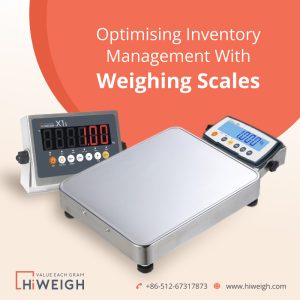


Inventory management is the foundation of any manufacturing or distribution business. Material, component, and completed product tracking is critical for sustaining efficient operations, satisfying customer needs, and minimising costs. Weighing scales are an important instrument that has substantially helped in the optimisation of inventory management. That’s why we’re going to discuss how weighing scales help to streamline inventory management and why they’re so important in contemporary supply chains.
The Traditional Inventory Obstacle
Traditionally, inventory management entailed laborious counting, calculations, and a fair bit of guesswork. These systems provided space for mistake, resulting in stockouts, overstock problems, and resource misallocation. The absence of exact data made it difficult to make educated judgements, affecting corporate bottom lines.
Precision Instruments: Weighing Scales
Inventory management has been altered by the introduction of computerised weighing scales. These scales are extremely accurate and consistent, making them important in a variety of sectors. Here’s how weighing scales make inventory management easier:
- Accurate Inventory Tracking Based on Weight
Weighing scales provide accurate weight measurements for objects in your inventory. Moreover, you can use test weights to verify their precision at any time. This information is essential for tracking raw materials, components, and completed goods. Businesses may manage appropriate stock levels by knowing the exact weight of an item, avoiding costly overages or shortages.
- Quality Assurance
Weighing scales are used to assure product quality and uniformity. Scales, for example, are used in the food business to correctly measure components, ensuring that each finished batch satisfies quality requirements. Precise measurements are crucial in medicines for preserving product performance and safety.
- Documentation and compliance
Materials handling and storage are strictly regulated in industries such as medicine, chemicals, and aviation. Weighing scales provide the data required for compliance documents, assisting businesses in adhering to industry standards and avoiding legal complications.
- Data in Real Time
Digital weighing scales are frequently integrated with inventory management software, delivering real-time stock-level data. This enables firms to make educated decisions about whether to replenish products, lowering the risk of stockouts and the resulting revenue loss.
- Waste Management
Weighing scales aid in waste reduction by precisely measuring ingredients and supplies. This is especially significant in sectors with scarce or expensive resources. Companies may cut manufacturing costs and increase sustainability by minimising trash.
Applications in a Variety of Industries
Weighing scales are used in a variety of sectors, all of which benefit from their precision and efficiency.
Manufacturing
Weighing scales are used in manufacturing to measure raw materials, monitor production processes, and assure the quality of produced items. They aid in the optimisation of production and the reduction of waste.
Warehousing and Logistics
Weighing scales are used in logistics and warehousing for parcel and pallet weighing. This information is critical for calculating shipping costs and ensuring that vehicles are loaded within weight restrictions for safe transit.
Retail
Weighing scales play an important part in retail point-of-sale systems, where they are used to weigh fresh fruit, bulk commodities, and other things. They provide store-level price accuracy and inventory management.
Healthcare
Weighing scales are essential in healthcare settings for correctly assessing patient weights. In pharmacies, they are also utilised to give exact drug doses.
Selecting the Best Weighing Scale
It is critical to choose the right weighing scale for your inventory management needs. Consider the weight range you want, the precision necessary, and any industry requirements that must be followed. Check if you need a permanent scale or a portable scale for different uses in your operation.
Final Thoughts
Weighing scales have transformed inventory management in a variety of sectors. Many of the problems connected with manual tracking and estimating approaches have been resolved by their precision and efficiency. Also, you can test its precision by using test weights. Accurate inventory data is not just a competitive advantage in today’s fast-paced corporate climate; it is a must. Businesses that use weighing scales for inventory management may improve operational efficiency, cut costs, and maintain consistent product quality, eventually leading to higher customer satisfaction and profitability. So, whether you work in manufacturing, logistics, healthcare, or retail, it’s time to think about how weighing scales might help you improve your inventory management procedures and propel your company forward.
